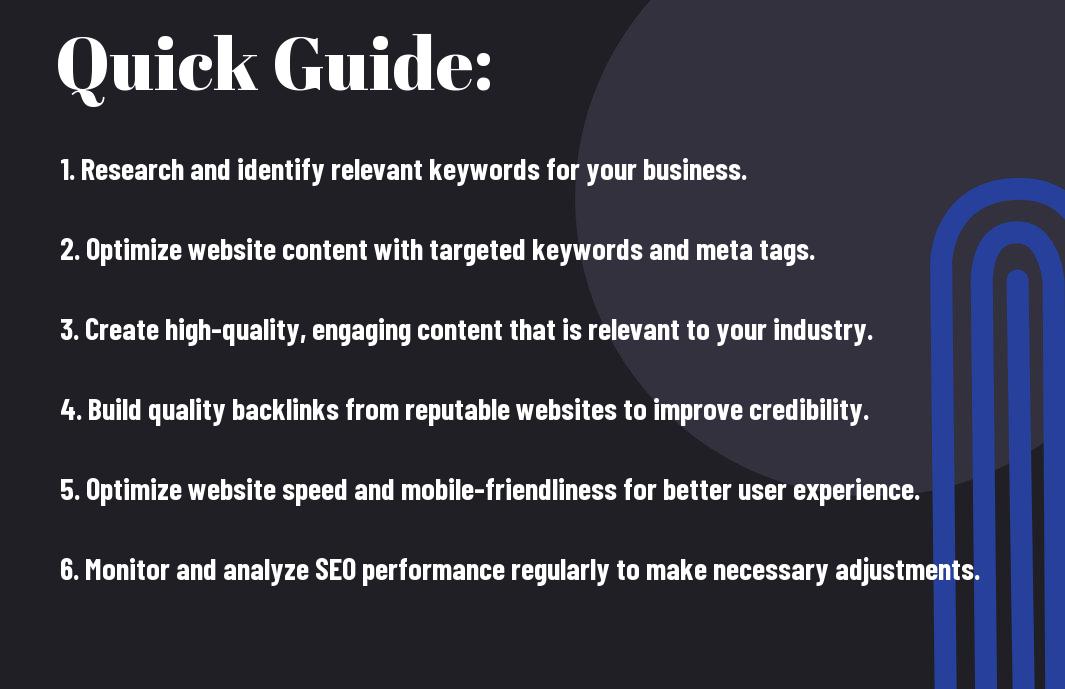Overwhelmingly, search engine optimization (SEO) plays a crucial role in the online visibility and success of small businesses. In this comprehensive guide, we will research into the best SEO practices specifically tailored for small businesses, providing you with the knowledge and tools necessary to enhance your online presence and reach a wider audience. By following these proven strategies and techniques, you can effectively boost your website’s ranking on search engine results pages and ultimately drive more traffic and leads to your business.
Key Takeaways:
- Keyword Research: Conduct thorough keyword research to understand your target audience’s search behavior and optimize your content accordingly.
- Local SEO: Focus on local SEO strategies such as creating a Google My Business profile, getting local citations, and optimizing your website for local keywords.
- Quality Content: Create high-quality, valuable content that is relevant to your audience’s needs and interests to improve your search engine rankings.


Understanding SEO
It is crucial for small businesses to have a solid grasp of SEO in order to improve their online visibility and attract more customers. If you want a more in-depth guide on local SEO strategies, check out A Comprehensive Guide to Local SEO Strategies for Small Businesses.
Types of SEO: On-Page, Off-Page, and Technical
SEO can be categorized into three main types: On-Page, Off-Page, and Technical. On-Page SEO focuses on optimizing the content and structure of your website, Off-Page SEO involves activities outside of your website to improve its authority and relevance, while Technical SEO deals with the backend elements that affect search engine rankings. Any successful SEO strategy should incorporate all three types to achieve the best results.
| On-Page SEO | Optimizing content, meta tags, and internal links |
| Off-Page SEO | Building backlinks, social media marketing, and influencer collaborations |
| Technical SEO | Improving site speed, mobile-friendliness, and website structure |
Key SEO Factors for Small Businesses
Assuming you are a small business looking to enhance your online presence, there are key SEO factors you should focus on to achieve better search engine rankings. These factors include content quality, keyword research, local SEO optimization, user experience, and mobile optimization. After implementing these strategies, you will likely see an improvement in your website’s visibility and organic traffic.
- Content Quality
- Keyword Research
- Local SEO Optimization
- User Experience
- Mobile Optimization
The success of your small business’s online presence heavily relies on how well you optimize your website for search engines. By focusing on these key SEO factors, you can effectively improve your website’s visibility and attract more organic traffic. After implementing these strategies consistently, you should monitor your website’s performance and make adjustments as needed to stay ahead of the competition.
Getting Started with SEO: A Step-by-Step Approach
After A Comprehensive Guide to SEO for Small Businesses, it’s vital to lay the groundwork for your SEO strategy. To help small businesses navigate through this process, breaking down the information into manageable steps is crucial.
Initial SEO Audit and Strategy Development
An Initial SEO Audit and Strategy Development is the first crucial step in optimizing your website for search engines. Conduct a comprehensive audit of your website to identify strengths, weaknesses, and opportunities for improvement. Analyze keyword performance, site speed, backlink profile, and overall site health to develop a solid SEO strategy tailored to your business goals.
Setting Up for SEO Success
Step-by-Step, Setting Up for SEO Success involves implementing technical optimizations, creating high-quality content, and building a strong backlink profile. This iterative process requires attention to detail and continuous monitoring to ensure your website’s visibility and rankings improve over time. By following best SEO practices and staying updated with industry trends, small businesses can compete effectively in the digital landscape.
This strategic approach to SEO lays the foundation for long-term success and improved online visibility for small businesses. By focusing on key areas such as technical SEO, content creation, and link building, businesses can establish a strong online presence and drive organic traffic to their websites.
Practical SEO Tips for Small Businesses
Keep your website optimized with these practical SEO tips for small businesses. Implementing these strategies can help improve your online visibility and attract more organic traffic to your site. The key is to focus on relevant keywords, high-quality content, and building authority through backlinks.
Content Optimization and Keyword Strategy
The first step in content optimization is to conduct keyword research to identify relevant terms and phrases that your target audience is searching for. Integrate these keywords strategically throughout your website content, including meta tags, headers, and body copy. Ensure that your content is informative, engaging, and valuable to your readers while also being optimized for search engines.
Building Authority with Backlinks
There’s no denying the power of backlinks in improving your website’s authority and search engine rankings. Backlinks are links from other websites that point to your site and signal to search engines that your content is trustworthy and valuable. With a strategic backlinking strategy, you can boost your website’s credibility and relevance in your industry.
With a combination of high-quality content, strategic keyword optimization, and a robust backlinking strategy, your small business can increase its online visibility and attract more potential customers. For more in-depth guidance on small business SEO and local search, check out Small business SEO and local search: the ultimate guide.
Advanced SEO Techniques
- Utilizing Local SEO for Community Engagement
- Leveraging Social Media for SEO
Utilizing Local SEO for Community Engagement
Engagement: One advanced technique for small businesses to boost their SEO is by utilizing local SEO strategies to engage with their community. By targeting location-specific keywords, creating locally-focused content, and optimizing Google My Business listings, businesses can increase their visibility in local searches and connect with potential customers in the community.
Leveraging Social Media for SEO
Utilizing social media can significantly impact a small business’s SEO efforts. By sharing website content, engaging with followers, and encouraging social sharing, businesses can increase their online visibility and drive traffic to their website. Additionally, active social media profiles can improve a business’s credibility and authority in the eyes of search engines, leading to higher search rankings.
A comprehensive social media strategy that includes regular posting, engagement with followers, and utilizing relevant hashtags can help small businesses amplify their online presence and reach a larger audience. By incorporating social media into their overall SEO strategy, businesses can improve their search engine rankings and attract more organic traffic to their website.
Measuring SEO Success
Once again, it’s crucial for small businesses to understand how to measure the success of their SEO efforts. By tracking progress and closely monitoring key metrics, businesses can optimize their strategies for better results.
Tools and Metrics for Tracking Progress
Progress: Small businesses can leverage a variety of tools and metrics to track the progress of their SEO campaigns. Popular tools like Google Analytics, SEMrush, Moz, and Ahrefs provide valuable insights into website traffic, keyword rankings, backlinks, and more. By regularly analyzing these metrics, businesses can gauge the effectiveness of their SEO strategies and make data-driven decisions for improvement.
Regular SEO Maintenance and Updates
While regular SEO maintenance and updates may seem time-consuming, they are vital for sustainable success in search engine rankings. Updating website content, optimizing meta tags, monitoring site speed, and fixing broken links are all part of ongoing SEO efforts that help maintain and improve search visibility. Search engine algorithms are constantly evolving, so staying proactive with updates is key to staying ahead in the digital landscape.
Pros and Cons of SEO Investments
| Pros | Cons |
| Increased visibility and brand awareness | Initial high costs for quality SEO services |
| Targeted traffic and higher conversion rates | Time-consuming process for results |
| Long-term sustainable results | Constant algorithm changes affecting rankings |
| Measurable results and ROI tracking | Competition for top search rankings |
| Enhanced user experience and website usability | Need for ongoing optimization and maintenance |
Long-term Benefits of Effective SEO
Some long-term benefits of effective SEO strategies for small businesses include improved organic search rankings, increased website traffic, and sustainable online visibility. By investing in quality SEO practices, businesses can establish a strong digital presence, build credibility with users, and drive consistent organic traffic over time.
Considerations and Challenges in SEO Implementation
Now, small businesses need to consider various factors and challenges when implementing SEO strategies. This includes understanding the ever-evolving search engine algorithms, staying updated on industry trends, and adapting to changing consumer behaviors. Additionally, businesses must be prepared for the time and resources required for effective SEO implementation, such as conducting keyword research, creating quality content, and monitoring performance metrics.
Understanding the complexities of SEO implementation and being proactive in addressing potential challenges are crucial for small businesses looking to maximize the benefits of their SEO investments and achieve long-term success in the competitive online landscape.
Final Words
The implementation of the best SEO practices is crucial for small businesses looking to establish a strong online presence and reach their target audience effectively. By following the comprehensive guide provided, businesses can optimize their websites and improve their search engine rankings, ultimately driving more organic traffic and increasing their visibility in the digital landscape. Be mindful of, SEO is an ongoing process that requires dedication and effort, but the results are well worth it. Stay updated with the latest trends, continue optimizing your content, and monitor your performance regularly to ensure sustained success in the competitive online market. With the right strategy and commitment, small businesses can harness the power of SEO to truly make an impact and thrive in the digital age.
FAQ
Q: What are the key SEO practices for small businesses?
A: The key SEO practices for small businesses include optimizing website content with relevant keywords, improving website loading speed, creating high-quality backlinks, optimizing for mobile, and regularly updating content.
Q: Why is local SEO important for small businesses?
A: Local SEO is crucial for small businesses as it helps them target local customers, improve visibility in local search results, increase foot traffic to physical stores, and build brand awareness within their community.
Q: How can small businesses measure the success of their SEO efforts?
A: Small businesses can measure the success of their SEO efforts by tracking website traffic, monitoring keyword rankings, analyzing conversion rates, assessing backlink quality, and utilizing tools like Google Analytics to gain insights into user behavior and engagement.
CATEGORY:Website Design

